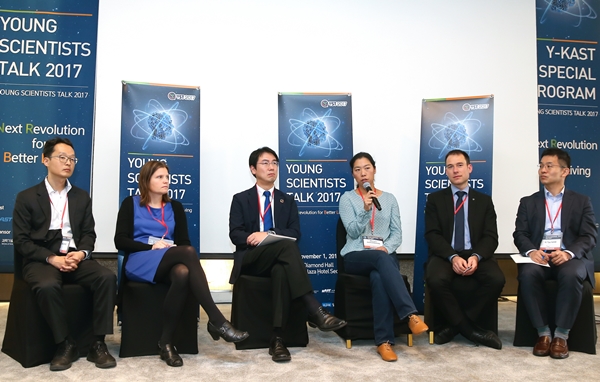As part of the Korea Science Week 2017 (30 Oct – 1 Nov), the recently established Young Korean Academy of Science and Technology (Y-KAST) organised and hosted a one-day “Young Scientists Talk 2017” event on 1 November 2017 in Seoul on the theme “Revolution for better Living”. The event brought together young leading researchers in Korea and from around the world for networking and exchanging scientific knowledge. The programme consisted of a plenary session of globally outstanding young leaders, a presentation and panel discussion session of members with National Young Academies as well as group discussion sessions on science related policies.
In addition to representatives of Y-KAST, Miriam Akkermann (Die Junge Akademie, Germany), Marie Wiberg (Young Academy of Sweden), Mitsunobu Kano (Young Academy of Japan, GYA Alumnus), and Moritz Riede (Global Young Academy) briefly presented their respective academies. Afterwards, the young scientists joined a panel chaired by So-Jung Park (Member, Y-KAST / Professor, Ewha Womans University) and including plenary speakers Kyung Sun Kang (Fellow, KAST / Professor, Seoul National University), Gunnar Öquist (Professor Emeritus, Umeå University / Member, The Royal Swedish Academy of Sciences / Member, Young Academy of Sweden) and Sang Hyuk Son (Fellow, KAST / President, Daegu Gyeongbuk Institute of Science & Technology (DGIST)).
The topic of the panel was role of young scientists in the forth industrial revolution and their proposals for society. The discussion revolved around the questions:
1) What is the desirable role of young scientists in this environment?, and
2) What are some policy recommendations and best practices in which organisations and academies can support young scientists to perform their role?
Young scientists were considered to play a critical role in the fourth industrial revolution and seen as having the ability to be the key drivers of scientific progress if they are given the right opportunities. The challenges society faces cannot be solved by one discipline alone and rapid technological progress requires the involvement of humanities and social sciences more than ever. Increasing diversity, both cultural and disciplinary, was considered essential in this context, and in this respect, young scientists are growing up in an ever more connected world.
Another highlighted challenge was balancing curiosity-driven and challenge-based research. At the moment, the system seems to bend towards the extreme of lending lend more support to the entrepreneurial scientist, described as a scientist doing more incremental research following the stream, but steering faster than the stream. The other extreme side, pioneer scientists, need time to reflect and take risks following only their curiosity, but are hence often considered “unproductive” in the current system and suffer as a result both from recognition and income to fund their research. So what is the way forward for young scientists? A re-balancing would require both a change in the funding system and the evaluation system, and it would make a big difference for young scientists in shaping the technological revolution.
